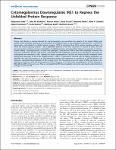Cytomegalovirus Downregulates IRE1 to Repress the Unfolded Protein Response
Stahl, Sebastian
Burkhart, Julia M.
Hinte, Florian
Tirosh, Boaz
Mohr, Hermine
Zahedi, René P.
Sickmann, Albert
Ruzsics, Zsolt
Budt, Matthias
Brune, Wolfram
During viral infection, a massive demand for viral glycoproteins can overwhelm the capacity of the protein folding and quality control machinery, leading to an accumulation of unfolded proteins in the endoplasmic reticulum (ER). To restore ER homeostasis, cells initiate the unfolded protein response (UPR) by activating three ER-to-nucleus signaling pathways, of which the inositol-requiring enzyme 1 (IRE1)-dependent pathway is the most conserved. To reduce ER stress, the UPR decreases protein synthesis, increases degradation of unfolded proteins, and upregulates chaperone expression to enhance protein folding. Cytomegaloviruses, as other viral pathogens, modulate the UPR to their own advantage. However, the molecular mechanisms and the viral proteins responsible for UPR modulation remained to be identified. In this study, we investigated the modulation of IRE1 signaling by murine cytomegalovirus (MCMV) and found that IRE1-mediated mRNA splicing and expression of the X-box binding protein 1 (XBP1) is repressed in infected cells. By affinity purification, we identified the viral M50 protein as an IRE1-interacting protein. M50 expression in transfected or MCMV-infected cells induced a substantial downregulation of IRE1 protein levels. The N-terminal conserved region of M50 was found to be required for interaction with and downregulation of IRE1. Moreover, UL50, the human cytomegalovirus (HCMV) homolog of M50, affected IRE1 in the same way. Thus we concluded that IRE1 downregulation represents a previously undescribed viral strategy to curb the UPR.
Dateien zu dieser Publikation
Keine Lizenzangabe
Verwandte Publikationen
Anzeige der Publikationen mit ähnlichem Titel, Autor, Urheber und Thema.
-
2008-11-19ZeitschriftenartikelSpecific Inhibition of the PKR-Mediated Antiviral Response by the Murine Cytomegalovirus Proteins m142 and m143 Budt, Matthias; Niederstadt, Lars; Valchanova, Ralitsa S.; Jonjic, Stipan; Brune, WolframDouble-stranded RNA (dsRNA) produced during viral infection activates several cellular antiviral responses. Among the best characterized is the shutoff of protein synthesis mediated by the dsRNA-dependent protein kinase ...
-
2012-12-21ZeitschriftenartikelProtein-Protein Interaction Domains of Bacillus subtilis DivIVA Baarle, Suey van; Celik, Ilkay Nazli; Kaval, Karan Gautam; Bramkamp, Marc; Hamoen, Leendert W.; Halbedel, SvenDivIVA proteins are curvature-sensitive membrane binding proteins that recruit other proteins to the poles and the division septum. They consist of a conserved N-terminal lipid binding domain fused to a less conserved ...
-
2013-03-11ZeitschriftenartikelTowards further reduction and replacement of animal bioassays in prion research by cell and protein misfolding cyclic amplification assays Boerner, Susann; Wagenführ, Katja; Daus, Martin L.; Thomzig, Achim; Beekes, MichaelLaboratory animals have long since been used extensively in bioassays for prions in order to quantify, usually in terms of median infective doses [ID50], how infectious these pathogens are in vivo. The identification of ...

